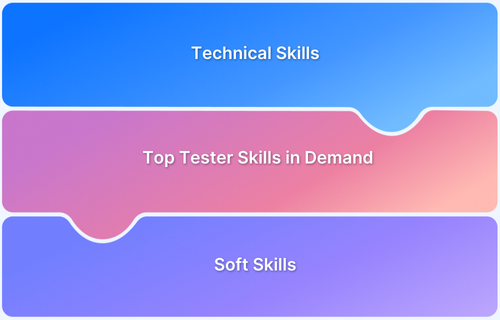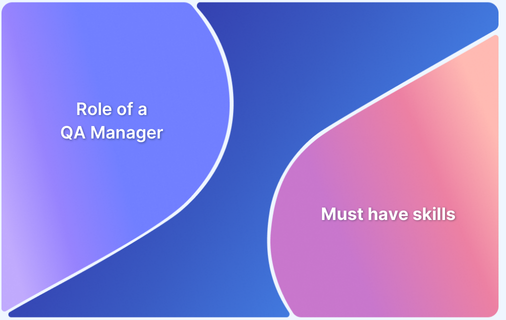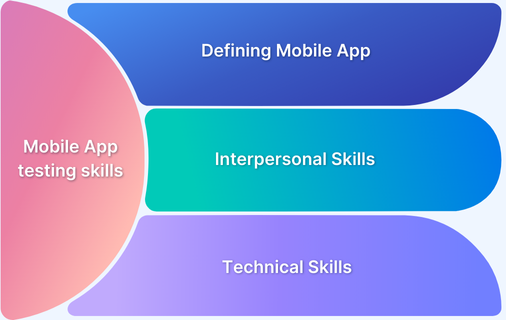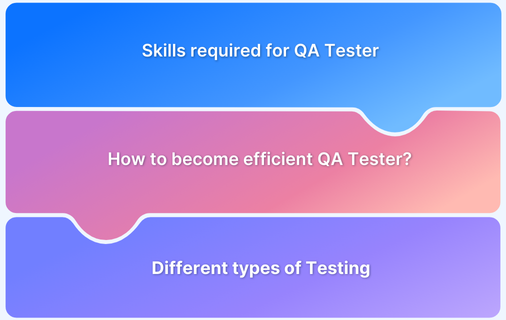Software testing is evolving, and today, as a tester, possessing technical expertise is not enough. To excel as a software tester, you must have a well-rounded skill set that consists of technical expertise, analytical thinking, and powerful communication.
You should also know how to handle test automation tools efficiently, coordinate with your team, and work seamlessly in a dynamic environment to facilitate efficient testing practices and ensure the quality of your software.
This article discusses in detail about the top software testing skills in demand.
What is a Software Tester?
A Software Tester is someone who checks software applications to make sure they work as expected. Their job is to find any bugs, errors or issues before the software is released for the end users. By testing the software thoroughly, they ensure that it meets all the required standards, is easy to use, and delivers a smooth experience for the end user.
Responsibilities of a Software Tester
A tester has various responsibilities that encompass various tasks that ensure a software system’s quality and functionality. These responsibilities can vary depending on the project requirements, testing type, and your role. Here’s an overview of a tester’s responsibilities:
Software Tester Responsibilities:
- Test Planning
- Test Case Design
- Test Execution
- Defect Reporting
- Regression Testing
- Performance Testing
- User Acceptance Testing (UAT)
- Collaboration
- Automation
- Documentation
- Test Planning: Creating a plan that outlines how testing will be done, including the scope and goals.
- Test Case Design: Writing test cases based on the software’s requirements to cover all possible scenarios.
Read More: Test Plan vs Test Case: Core Differences
- Test Execution: Running tests to check if the software behaves correctly, either manually or using automation tools.
- Defect Reporting: Identifying and reporting bugs or issues found during testing to the development team.
- Regression Testing: Testing the software again after changes or updates to ensure no new issues have been introduced.
- Performance Testing: Checking how the software performs under various conditions, such as high traffic or heavy usage.
- User Acceptance Testing (UAT): Ensuring the software meets the needs of the user and is ready for real-world use.
- Collaboration: Working with developers and other team members to understand the software and provide feedback on its quality.
- Automation: Writing automated test scripts to speed up testing and repeat common tests more efficiently.
- Documentation: Keeping detailed records of tests, results, and issues found to help track progress and improve future testing.
Future Scope as a Software Tester
There are a lot of opportunities for future growth as a software tester. It’s crucial to keep up with new trends, technologies, and approaches if you want to succeed as a software tester in the future. You can maintain your competitive edge in this fast-paced industry by constantly learning, picking up new skills, and adopting evolving testing practices. Following are some areas with great potential for growth:
- Test Automation: The demand for automated testing solutions using automation frameworks such as Selenium, Cypress, Appium, is increasing rapidly. Organizations aim to deliver software more efficiently and at a faster pace and acquiring skills in test automation frameworks and tools such as Percy and BrowserStack Automate can prove highly valuable in the future.
- CI/CD and DevOps: Agile methodologies and DevOps practices are highly popular in the field of Software Development. Software Testers who can adapt to these methodologies will have a competitive advantage in teams using them. Software testers aware of CI/CD tools and skilled at working with CI/CD workflows will be invaluable in companies working with such practices.
- Test Data Analytics and AI: Data Analytics, artificial intelligence, and machine learning are being used more frequently in software testing. According to the current trend, software testers are going to benefit from knowledge of test metrics, test data analytics, and the application of AI/ML for anomaly identification and test case optimization in the future.
- Domain-specific Testing: Depending on the experience and skill a Software tester may have in a specific sector, specializing in domain-specific testing may be beneficial. Businesses in sectors like finance, healthcare, e-commerce, or gaming frequently need testers with in-depth knowledge of the testing difficulties unique to those industries.
Also Read: Top 10 Skills of a Proficient QA Manager
Top 12 Technical Software Testing Skills in Demand in 2025
In 2025, the demand for skilled software testers is expected to continue growing as software becomes more integral to business success and increasingly complex. With the rapid adoption of automation, agile workflows, and new technologies, testers need a solid mix of technical skills to stay ahead.
Below are the Top 12 Technical Skills for freshers and experienced software testers that will be in high demand by 2025:
Top Technical Software Testing Skills:
- Automated Testing Tools and Frameworks
- Programming and Scripting Languages
- Test Planning and Design
- Performance and Load Testing
- Security Testing
- API Testing
- Database/SQL Skills
- Continuous Integration and Continuous Deployment (CI/CD)
- Version Control Systems
- Cross-Platform Testing
- SDLC & STLC Knowledge
- Agile Methodology
1. Automated Testing Tools and Frameworks
Automated testing is essential for improving speed and efficiency. Testers must be comfortable with tools like Selenium and platforms such as BrowserStack Automate to execute tests across multiple devices and browsers seamlessly. Automation ensures that tests can run quickly and frequently, helping to catch defects earlier.
2. Programming and Scripting Languages
Testers need a solid understanding of programming languages like Python, Java, or JavaScript for writing automation scripts. Knowledge of these languages will enable testers, especially newcomers, to develop, maintain, and improve automated test suites effectively.
3. Test Planning and Design
Test planning and designing effective test cases are foundational skills for ensuring software quality. Strong test design helps testers cover all user scenarios and ensures that the software meets both functional and non-functional requirements. This is crucial for thorough, efficient testing.
4. Performance and Load Testing
As software applications become more complex, performance and load testing are essential to ensure scalability and reliability. Familiarity with tools like JMeter or LoadRunner allows testers to simulate real-world conditions and evaluate how the software performs under stress, which is critical for high-traffic applications.
5. Security Testing
With the growing frequency of cyberattacks, security testing is a must. Knowledge of security tools like OWASP ZAP and Burp Suite allows testers to identify vulnerabilities and ensure that applications meet security standards, protecting them from potential breaches.
6. API Testing
As modern applications rely on APIs for communication between services, API testing becomes critical. Proficiency with tools like Postman,and SoapUI helps testers verify the functionality, reliability, and performance of APIs, ensuring they work as expected under various conditions.
7. Database/SQL Skills
A deep understanding of databases and the ability to write SQL queries are essential for backend testing. Testers need these skills to validate data integrity, perform complex data checks, and ensure that data is stored and retrieved accurately across different systems.
Read More: Backend Automation Testing Tools
8. CI/CD (Continuous Integration and Continuous Deployment)
CI/CD has revolutionized modern software development, and testers need to be proficient in integrating testing into these automated pipelines. CI/CD Tools like Jenkins, CircleCI etc. ensure that testing happens frequently and automatically during the development and deployment process, catching issues earlier in the cycle.
9. Version Control Systems
Proficiency in Git is essential for software testers, especially in collaborative environments. Version control helps testers track changes to test scripts, collaborate effectively with developers, and ensure that test scripts are always in sync with the latest codebase.
10. Cross-Platform Testing
Testing across different devices and platforms is vital for ensuring that software functions consistently. Tools like BrowserStack allow testers to test applications across 3500+ browsers, operating systems, and devices, ensuring that users have a smooth experience, regardless of the platform they use.
11. SDLC & STLC Knowledge
A solid understanding of the Software Development Life Cycle (SDLC) and the Software Testing Life Cycle (STLC) helps testers align their testing activities with the overall development process. Knowledge of these frameworks allows testers to plan their efforts effectively and ensure comprehensive testing at each stage.
12. Agile Methodology
As Agile continues to dominate development workflows, testers must be comfortable working within Agile frameworks. Familiarity with tools like JIRA allows testers to stay aligned with sprint goals, participate in daily stand-ups, and adapt to rapid changes during the development cycle.
These technical skills, from automation tools to Agile practices, will be key to success for software testers in 2025. As the industry evolves, staying updated with these trends will be essential for maintaining a competitive edge in the job market.
Top Soft Skills in Demand for Software Testing
In software testing, while technical skills are important, soft skills like communication, adaptability, and problem-solving are equally crucial for success. Below are the key soft skills that every software tester should develop:
Top Soft Skills in Software Testing:
- Communication and Collaboration
- Analytical Thinking and Problem Solving
- Project Management
- Adaptability and Flexibility
- Time Management and Prioritization
- User-Centric Mindset
- Critical Thinking and Innovation
- Continuous Learning and Improvement
1. Communication and Collaboration
Clear communication is vital for testers to explain their findings and work effectively with developers and managers. Testers need to be able to articulate issues, suggest solutions, and actively participate in team discussions. For beginners, strong communication skills help them integrate into teams smoothly.
2. Analytical Thinking and Problem Solving
Testers must be able to analyze complex systems and find hidden problems. This skill helps testers understand how software works and quickly identify potential issues. For those starting out, analytical thinking allows them to spot bugs and vulnerabilities early in the process.
3. Project Management
While testers aren’t always in charge of managing projects, understanding project management basics helps them stay organized and meet deadlines. Freshers who grasp time management and prioritization early will be able to manage tasks effectively and contribute to the project’s success.
4. Adaptability and Flexibility
Software testing constantly evolves with new tools, techniques, and project needs. Testers need to be adaptable, especially in agile environments where requirements can change quickly. Flexibility helps testers adjust to new tools or shifts in project goals, ensuring they stay effective.
5. Time Management and Prioritization
Testers often handle multiple tasks, making time management crucial. Prioritizing tasks based on urgency ensures that the most critical testing activities are completed first. For newcomers, learning how to manage time helps reduce stress and ensures deadlines are met without compromising quality.
6. User-Centric Mindset
A tester’s job is more than just finding bugs—it’s about ensuring the software provides a great user experience. A user-centric mindset helps testers think like the end user and identify usability issues. This skill ensures the software meets both functional and user experience expectations.
7. Critical Thinking and Innovation
Testers need to approach problems logically and find effective solutions. Innovation in testing helps drive improvements in processes and tools. Testers who think creatively can optimize testing practices and contribute to better results, driving the process forward.
8. Continuous Learning and Improvement
The tech industry is fast-moving, and testers need to stay updated with the latest tools and practices. Committing to continuous learning ensures testers remain effective and adaptable. For freshers, a commitment to learning from the start will help them adapt quickly and grow their careers.
Soft skills are just as essential as technical knowledge in software testing. For those starting their careers, focusing on these skills will give them a competitive edge. By developing both technical and soft skills, testers can excel in today’s dynamic software development environment.
What is a Test Engineer?
On the other hand, a test engineer usually has a wider skill set and a more technical job. They might focus on creating and putting into place the frameworks, tools, and infrastructure for testing.
Some of the responsibilities and skills required to be a successful Test Engineer include:
- Test planning and strategy: Test engineers participate in a project’s overall testing strategy. They examine the requirements, pinpoint testable features, and create a thorough testing strategy.
- Test automation: To speed up the testing process, test engineers create and manage automated test scripts and frameworks. They use scripting and programming languages to build automated tests that can be run repeatedly.
- Testing for performance and scalability: Test engineers concentrate on assessing the software’s performance and scalability features. They create and run tests to evaluate the system’s performance under various load scenarios and spot any potential bottlenecks or performance problems.
- CI/CD: Testing is incorporated into the continuous integration and delivery (CI/CD) pipeline by test engineers working with developers and DevOps teams. At various stages of the software development lifecycle, they aid in the establishment of testing procedures and equipment that facilitate automated testing.
Future Scope as a Test engineer
Given the changing nature of software development and the rising need for high-quality software products, the future prospects for test engineers look bright. The following are some areas where test engineers’ future work may be influenced:
- Test automation and Continuous testing: These areas will continue to have a strong demand for test engineers that are knowledgeable in the frameworks, tools, and scripting languages used in test automation. With the growing emphasis on DevOps and Continuous Integration/Continuous Delivery (CI/CD), the ability to design and implement efficient test automation solutions that integrate seamlessly into the development pipeline will be valuable.
- Performance Engineering: As software systems become more complicated and their user bases grow, performance testing and optimisation are essential. To make sure that software works properly under diverse circumstances and user loads, test engineers who specialize in performance engineering, load testing, and scalability testing will be essential.
- Security Testing: Test engineers with experience in security testing and penetration testing will be in high demand due to the rising frequency of security breaches and the growing necessity of data protection. Essential skills will include the capacity to spot vulnerabilities, carry out detailed security assessments, and recommend corrective actions.
- IoT Testing: Test engineers with expertise in IoT testing, mobile app testing, and compatibility testing will be highly valuable as Internet of Things (IoT) and mobile technologies evolve. It will be essential to have experienced test engineers to provide smooth connectivity, device compatibility, and user experience across many platforms and devices.
Also Read: Top 10 Skills of a Proficient QA Manager
Software Tester vs Test Engineer
A software tester and a test engineer are both roles involved in the testing process of software development, but they can have different responsibilities and levels of expertise.
Test engineers possess technical expertise and may have knowledge of programming and scripting languages. They are proficient in test automation frameworks, performance testing tools, and security testing methodologies. They often specialize in specific areas such as test automation, performance engineering, or security testing.
On the other hand Software Testers typically have strong domain knowledge, understanding of testing methodologies, and proficiency in manual testing techniques. They may also be skilled in test case design, bug tracking systems, and test documentation.
It’s important to note that the specific responsibilities and job titles can vary across different organizations and industries. Some companies may use the terms “software tester” and “test engineer” interchangeably or have their own unique definitions for these roles.
Conclusion
Test engineers and Software Testers are both roles that are currently in high demand with excellent opportunities for growth in the future. Pivoting into these fields can be highly beneficial and lucrative. Test University by BrowserStack allows people with various levels of experience to learn the skills and knowledge required to do so.
This all-in-one learning platform allows users to learn practical technologies and frameworks in order to improve their testing skills. Users can get specialization certificates in manual and automation testing from BrowserStack. So get certified and start a career in software testing today.
Frequently Asked Questions
1. Which section of testing is the highest paid?
Automation testing is generally the highest paid type of software testing. This is because it requires skills in programming and the ability to work with advanced automation tools. Testers who specialize in automation often earn more due to the demand for their expertise in improving testing efficiency.






